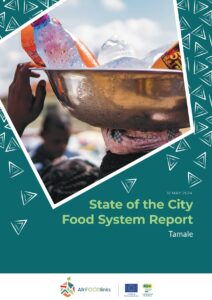

State of City Food System Report – Tamale
This report profiles Tamale, Northern Ghana, examining the character and dynamics of the city’s food systems. It offers a holistic perspective, detailing the historical development, growth factors, and governance practices that influence infrastructure and service delivery.
Summary
This report profiles Tamale, Northern Ghana, examining the character and dynamics of the city’s food systems. It offers a holistic perspective, detailing the historical development, growth factors, and governance practices that influence infrastructure and service delivery. The report argues that Tamale’s founding and governance practices have led to unequal access to essential urban infrastructure and services, such as roads, water, electricity, and sanitation. Despite decentralised governance, resource constraints and central government dominance have hindered significant improvements. The city’s food system faces challenges due to inadequate infrastructure in food retail spaces, insufficient storage facilities, and unsafe transport for fresh meat. To address these issues, a collaborative approach involving key stakeholders is essential to transform and stabilise the food system. The local government must recognise the interconnection between the city’s food system and other urban systems, advocating for comprehensive and dialogical multi-stakeholder governance to guide this transformation.
The state of the city food system reports are brought to you by the AfriFOODlinks project, funded by the European Union.

